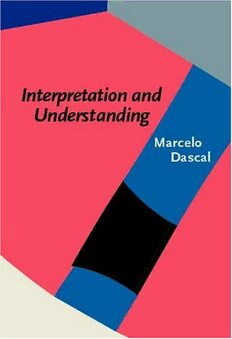Download Interpretation and Understanding PDF Free - Full Version
Download Interpretation and Understanding by Marcelo Dascal in PDF format completely FREE. No registration required, no payment needed. Get instant access to this valuable resource on PDFdrive.to!
About Interpretation and Understanding
Our species has been hunting for meaning ever since we departed from our cousins in the evolutionary tree. We developed sophisticated forms of communication. Yet, as much as they can convey meaning and foster understanding, they can also hide meaning and prevent comprehension. Indeed, we can never be sure that a "yes" conveys assent or that a smile reveals pleasure. In order to ascertain what communicative behavior "means", we have to go through an elaborate cognitive process of interpretation. This book deals with how we achieve the daily miracle of understanding each other. Based on the author 's contributions to pragmatics, the book articulates his perspective using the insights of linguistics, the philosophy of language and rhetoric, and confronting alternatives to it. Theory formation is shaped by application to fields of human activity - such as legal practice, artificial intelligence, psychoanalysis, the media, literature, aesthetics, ethics and politics - where interpretation and understanding are paramount. Using an accessible language, this is a book addressed to specialists as well as to anyone interested in interpreting understanding and understanding the potentialities and limits of interpretation.
Detailed Information
| Author: | Marcelo Dascal |
|---|---|
| Publication Year: | 2003 |
| ISBN: | 9789027295897 |
| Pages: | 737 |
| Language: | English |
| File Size: | 3.939 |
| Format: | |
| Price: | FREE |
Safe & Secure Download - No registration required
Why Choose PDFdrive for Your Free Interpretation and Understanding Download?
- 100% Free: No hidden fees or subscriptions required for one book every day.
- No Registration: Immediate access is available without creating accounts for one book every day.
- Safe and Secure: Clean downloads without malware or viruses
- Multiple Formats: PDF, MOBI, Mpub,... optimized for all devices
- Educational Resource: Supporting knowledge sharing and learning
Frequently Asked Questions
Is it really free to download Interpretation and Understanding PDF?
Yes, on https://PDFdrive.to you can download Interpretation and Understanding by Marcelo Dascal completely free. We don't require any payment, subscription, or registration to access this PDF file. For 3 books every day.
How can I read Interpretation and Understanding on my mobile device?
After downloading Interpretation and Understanding PDF, you can open it with any PDF reader app on your phone or tablet. We recommend using Adobe Acrobat Reader, Apple Books, or Google Play Books for the best reading experience.
Is this the full version of Interpretation and Understanding?
Yes, this is the complete PDF version of Interpretation and Understanding by Marcelo Dascal. You will be able to read the entire content as in the printed version without missing any pages.
Is it legal to download Interpretation and Understanding PDF for free?
https://PDFdrive.to provides links to free educational resources available online. We do not store any files on our servers. Please be aware of copyright laws in your country before downloading.
The materials shared are intended for research, educational, and personal use in accordance with fair use principles.

